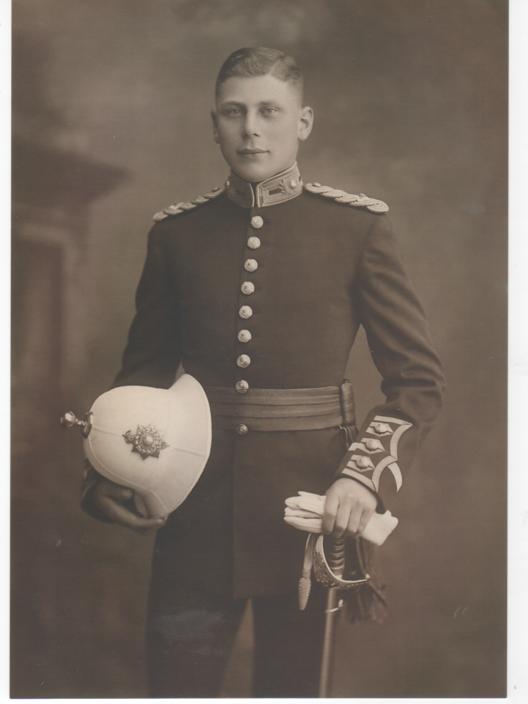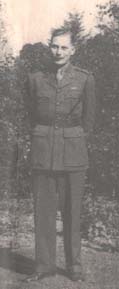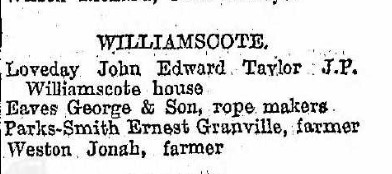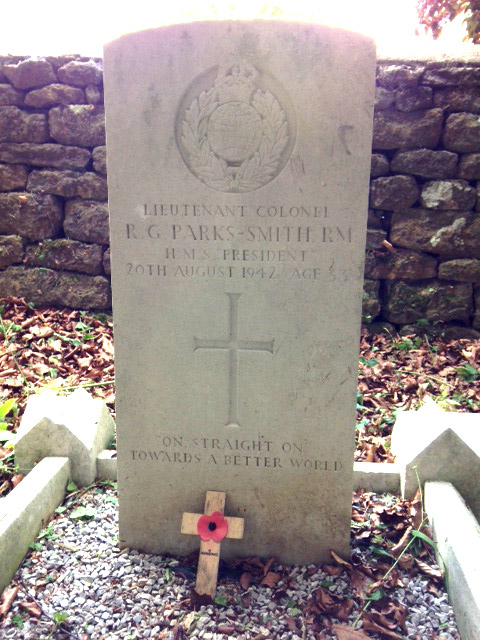Millennium Project
Rob Forsyth
Robert (Bobbie) Granville PARKS-SMITH MD Royal Marines (1909-42) Lieutenant Colonel
Son of Ernest and Elizabeth Parks-Smith and husband of Aline, neé Sykes Wright, of Walmer Kent and father of David (b1939) and Jill (b1942)
Lt Col Parks-Smith served in Combined Ops as a staff officer under Lord Mountbatten and took part in the raid on Dieppe. He was in command of a Royal Marine beach party which came ashore on White beach on 19 August in the first landings. He was wounded not long after and died of his wounds next day back in England.
He is buried at St Peter ad Vincula Parish Church, South Newington. It has a Commonwealth War Graves Commission Headstone. He is remembered on the Old Boys (Blues) War Memorial and in a book Freedom We Died for You by David Miller at his old school Christ's Hospital.
|
|
Bobbie was born in 1909 in Williamscote, a small village in Warwickshire, where his parents, Ernest (1881-1958) and Elizabeth, farmed - as recorded by Kelly’s Directory in 1907 |
|
He went to school at Christ’s Hospital (Bluecoat’s) in Horsham (Middleton B 1920-27)from where he was commissioned into the Royal Marines. He was promoted to Lieutenant in 1930 and to Captain in 1936 after serving overseas in HMS Queen Elizabeth and HMS Adventurer. He pioneered the techniques for parachute landing of troops. In this photograph he is wearing the dress uniform of a 2nd Lieutenant.
|
 |
His wife, Aline, grew up in Walmer, Kent. where her father, Colonel Cecil Sykes-Wright OBE RM1,and mother, Lilian, established a family home in which their granddaughter, Lady (Jill) Garrod2 (née Parks-Smith) still lives today.
 |
|
Deddington. The planning for what was to be the first big test of the new organisation – The Dieppe Raid in August 1942 - allowed only the very occasional break from work; so Aline and their first child David (2) came to live in Deddington for a while because it was close to where Bobbie's parents were now farming in South Newington 4 miles from Deddington. Aline and the 2 year old David lived in rented accommodation that was part of Holcombe House owned by Mr and Mrs Charles West. Mr West was a War Reserve Policeman in the village. The West’s daughters, José3 and her younger sister Betty, who were teenagers when the Parks-Smiths moved in, remember the family well and particularly the arrival of baby Gillian (Jill) in May 1942. José is still in touch with the then 18 year old Nanny to Jill, Mary Stanbra (now Harris), who lives locally and remembers Jill as 'the best and easiest of her babies'. After the family left the village Mary joined the ATS for the rest of the war. Major Jack Morris, who lived at Deddington Mill and was Commanding Officer of the Deddington Home Guard, became Jill's Godfather.
The Dieppe Raid incurred a large number of casualties but provided invaluable experience and knowledge for the eventual D-Day landings themselves.
The Royal Marine’s Museum’s official account includes this description of Lt Col Parks-Smith’s role: "A Royal Marine Provost party under Lt-Col R.G. Parks–Smith, a pioneer of parachute landing, was landed on White beach ‘to maintain discipline and order over all personnel’. It came ashore in the first flights but the Colonel was wounded not long after it landed. He was with the Beach Party, mainly responsible in this raid for preparing ‘the beaches for a smooth and expeditious withdrawal".
A second and longer account in the book The Jubilee Disaster (Ronald Atkin)gives a lot more detail and can be found HERE
Of the receipt of the dreadful news at Holcombe House Jill recounts “My brother David was only 3 at the time and I was 4 months old so I do not have any recollection of this of course. I do know that my mother was extremely fond of the Wests, and it was Mr West who had the awful task of breaking the terrible news about my father. The postman arrived with the telegram and didn't know what to do so he went to Mr West. I don't know the exact sequence of events, but I think Lady Hobart4, who lived in Leadenporch further down the road, came to the rescue and we went to stay with her. In due course my mother went to St John's, near Woking, to be near her sister, and thence back to Deal at the end of the War. A friend of her's from before the war, had also lost her Royal Marines husband at the Battle of the River Plate in HMS Exeter (I think the RMs manned the gun turret and it received a direct hit) and she wrote to my mother suggesting that she might come back to Deal and they would try and make a go of raising their children together.”
|
The report of his Will in The Banbury Advertiser on 14 April 1943 refers to him being 'of Deddington'.
Footnotes
1 Colonel Sykes-Wright joined the Royal Marine Corps in 1898. He retired in 1935 but returned to service for the whole of WWII in Naval intelligence.
2 Lieutenant General Sir Martin Garrod, KCB CMG OBE DL (1935 –2009).
Born in Darjeeling, India, he became a Naval Officer and joined the Royal Marines, serving in, among other places, Cyprus, Borneo and Belfast. He became Commandant General of the RM Corps and later went to Bosnia as a member of the EC Monitor Mission in 1993 helping rebuild Mostar. He was appointed the EU Special Envoy in 1995.
3 See also José Stevens' (née West) story 'Growing up in wartime Deddington' as recounted in A Parish at War
4 Major General Sir Percy Hobart KBE CB DSO MC (1885-1957) known as ‘Hobo’ was re-called from retirement (in Deddington) by Churchill to develop many of the specialised armoured vehicles (‘Hobart's Funnies’) that took part in the invasion of Normandy and later actions.
Robert's album in the Gallery contains more images for this article

